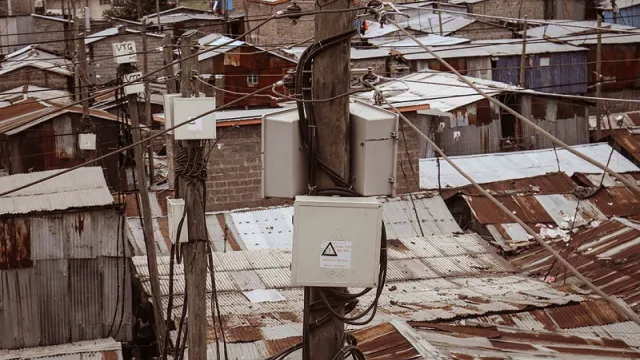Poor Kenyans may require a miracle to survive the coronavirus pandemic, but Safaricom has a plan

Poor Kenyans may require a miracle to survive the coronavirus pandemic, but Safaricom has a plan
Before Christine Soita and her two kids moved to Nairobi in February of last year, life was already unbearable. Immediately she arrived, she rented a habitable shack at Mukuru Kayaba slums in Nairobi South.
Since then, most of her daily routine involves hovering around the city doing day jobs – just trying to make ends meets.
In a good month, MS Soita takes home about eight thousand shillings; mostly from a couple of uptown bachelors who need their laundry done and a few deliveries in town.
The amount would normally cater for her rent, school fees for her six-year-old boy and the basics. But nothing could have prepared her for the current state of affairs, thanks to the COVID-19 pandemic. She hasn’t landed a single job since last month. All her potential employers have gone silent.
How she survives past April might require divine intervention, Christine told Maudhui house.
Read also:
- Coronavirus could be setting us up for a cashless society
- One month after Coronavirus, Kenya private sector is in recession
In the wake of a rampaging virus that is currently putting people out of work, she could be among the millions of low-income Kenyans who will face the music if the economic onslaught that the novel coronavirus is unleashing persists.
While most Kenyans have lost some or all of their income as a result of this pandemic, and the government tightens limits on movement to contain the spread of the virus, it is sobering to think about what options some of the most affected Kenyans have left to meet their basic needs.
After the 25th COVID-19 infection within Kenya’s borders, the government was forced to make some harrowing tradeoffs between life and death and economics.
A 7:00 pm to 5:00 am curfew will likely slow the spread, but granted that there are some reasons for hope, a complete lockdown may be hard to sustain unless the government can provide a safety-net for ordinary citizens who may solely depend on a day’s job to put food on the table.
In a country where half the population lives in struggle, the pandemic could usher in one of the most brutal economic times in living memory.
On March 24, the Government announced that it was seeking some Ksh 115 Billion from international lenders, money that will enable the country weather the coronavirus storm.
Although it still unclear how the funds will directly impact the ordinary mwananchi from the horrible impacts of the pandemic, some initiatives that various institutions have unveiled are quite encouraging.
Mobile titan Safaricom, for instance, will for the next 30 days enable it’s over 30 Million customers to purchase household items and personal effects using Bonga Points that they may have earned from using its services over the years.
Each point will fetch up to 30 cents which means that for about 1600 points, a customer can purchase maize flour, rice and a kg of milk payable through USSD *126# at any major retailer.
Time to be generous
Safaricom’s new boss Mr. Peter Ndegwa, says that generous Kenyans can also donate their points to those in need during these unprecedented times.
According to the telco’s books, there is nearly Ksh 4 Billion worth of unused Bonga points that Kenyans are yet to claim. Customers can donate as a gesture of solidarity and a collaborative spirit during this crisis.
To the needy families already living on the edge of survival, a decent meal is perhaps a distant memory. But a donation of a mere 500 Bonga points that any customer can make within seconds, could put food on their dinner table tonight.
Under almost any basic scenario, things look tough for many Kenyans. More painfully, the unique financial uncertainties that the pandemic has presented cannot be resolved overnight.
Yet, the current mess is still quite a far cry from what will come if the virus is not stopped dead on its tracks.
As the
battle to defeat the virus continues taking shape form multiple fronts, some
innovative local solutions that integrate with people’s daily lives may go a
long way to cushion the most vulnerable of us.



